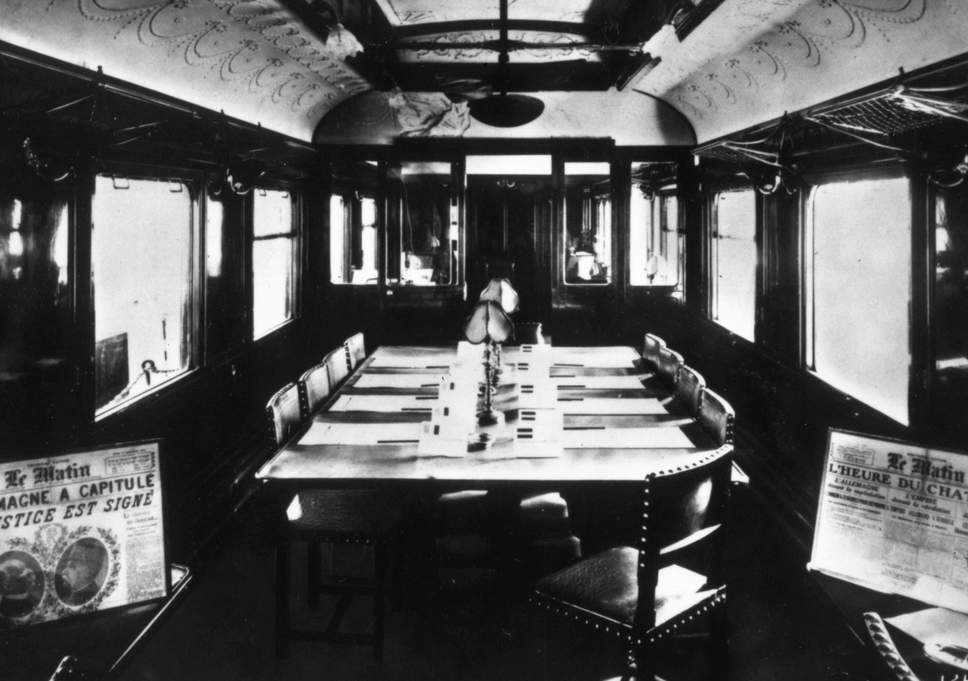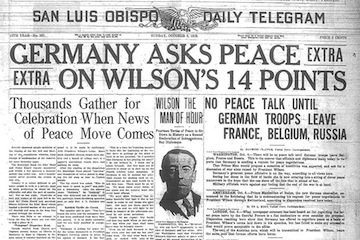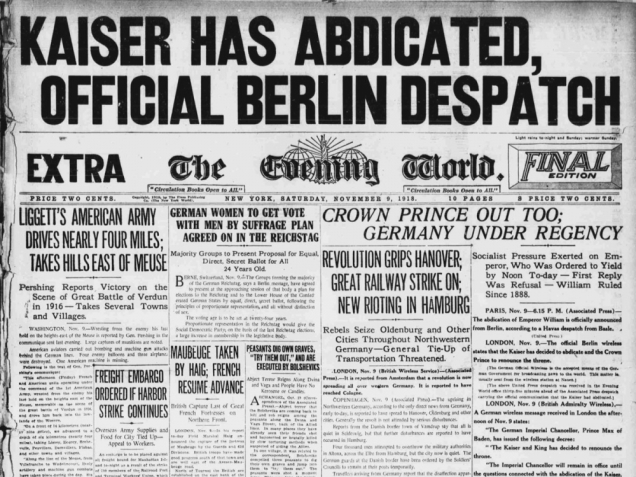Monarch Flees to Holland;
Deserters Flood Berlin,
Establish Socialist Government. Peace Talks About to be Launched.
Special to The Great War Project.
(9 November) By this time a century ago in the Great War, Germany, Austria, and all their allies have begun to sue for peace.
So reports historian Adam Hochschild. That includes — beside Germany and fast-dissolving Austria — Bulgaria and Ottoman Turkey. Austria’s army was “draining away in mass desertions,” observes Hochschild, “and in a feverish explosion of centrifugal nationalism, one after another of Austria-Hungary’s – ethnic groups proclaimed independence.”
“The battered German army,” reports Hochschild, “was eroding from its rear. The police chief of Berlin estimated that more than 40,000 deserters were hiding in his city.”
Indiscipline is increasing at an alarming rate.

Waiting for the negotiators at the railroad car at Compiegne
“Trying to stave off collapse, the Kaiser declared an amnesty for political prisoners, only to see 20,000 Berliners turn out to welcome the train that brought the socialist leader Karl Liebknecht back to Berlin” from prison.

Peace feelers from Germany.
At the same time, the Kaiser — Germany’s monarch — is failing to find a way to keep his throne. He travels to the German army’s Western Front headquarters at Spa in Belgium. He pledges to remain there as Germany’s leaders attempt to negotiate the terms of an armistice with the Kaiser retaining his throne.
But the Kaiser is shocked when “one after another of his officers tell him that he can no longer count on his soldiers’ loyalty.”
Hochschild reports: From the military commandant of Berlin, a telegram arrives. “All troops deserted. Completely out of hand.”
Worse followed, reports Hochschild.
“Revolutionaries seized the Kaiser’s own Berlin palace.” Liebknecht declares a soviet republic. Red flags and street barricades spring up everywhere.
“The Kaiser was stunned by a phone call from Berlin that told him that his abdication had been announced there.”
“Treason!” the Kaiser announces. Barefaced, outrageous treason.”
“His world in tatters,” reports historian Hochschild, “he left for exile in Holland.”
“And a socialist government headed by a trade unionist and former saddle maker – Liebknecht – took over in Berlin.”

Kaiser abdicates; war near its end.
“Just in time to sign a humiliating peace.”
The peace negotiations have already begun.

Mike, for four years I’ve followed your missives, passed them along through Facebook, encouraged others to read or follow your work through online comments. Thank you so much for the enlightening ride I’ve taken.
It’s 11/11/2018. Below is a poem written by my grandfather, William E. Daly, published in Columbus (the KofC magazine) in November, 1948 – the great war’s 50th Anniversary.
It’s his memory of November 1, 1918. He was with the 25th French Division in northern France.
ARMISTICE DAY
I remember, I remember
A day so long ago,
When I walked through the field of France
Where scarlet poppies grow.
The grass and weeds were shoulder high,
They crossed and laced between,
As if they wished to hold the dead,
Who, sleeping, were unseen.
Then as I brushed the grass aside,
I’d find a friend or foe,
And thrust his gun into the earth,
So that the spot would show.
I was alive! By grace of God
I still could think and feel;
Yet there were men who met their fate
In lethal bits of steel.
We all had played a gambler’s game
A few short days before.
My card was marked, “You will live on!”
Their’s read, “Your days are o’er!”
The torch, which from the stricken hands
Was passed along to me,
Must burn in the undying hope –
THAT MEN CONTINUE FREE.
The memory of those fallen men
Must live and never die.
God help me carry on for those
Less fortunate than I.
Christopher, thanks so much for this and for being such a committed reader. Much appreciated.
Pleasure’s been mine Mike. PLUS, I’m a decades-long time NPR listener (public radio station employee too) so I remember and appreciate your reporting from Moscow.